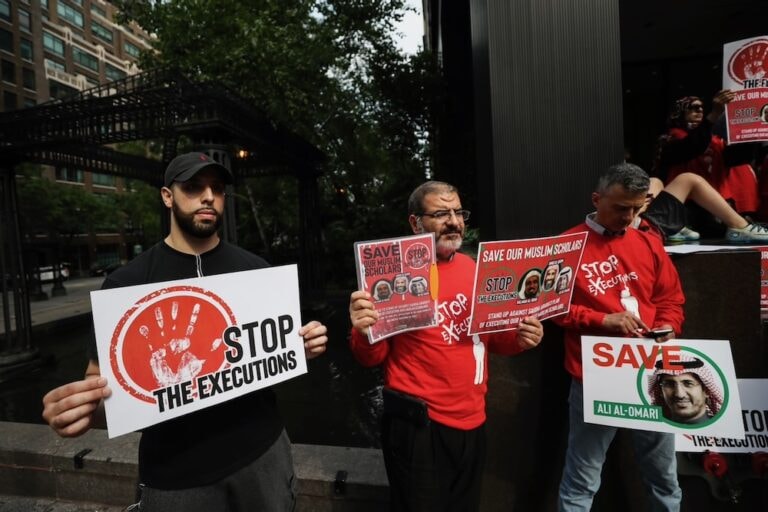(RSF/IFEX) – RSF has called on the Saudi government to stop its extensive intimidation of the country’s media, which has included jamming the radio station Al-Islah, cutting off opposition television broadcasts and making death threats to liberal journalists. Al-Islah, a radio station run by the Movement for Islamic Reform in Arabia (MIRA), is the first […]
(RSF/IFEX) – RSF has called on the Saudi government to stop its extensive intimidation of the country’s media, which has included jamming the radio station Al-Islah, cutting off opposition television broadcasts and making death threats to liberal journalists.
Al-Islah, a radio station run by the Movement for Islamic Reform in Arabia (MIRA), is the first and only opposition voice broadcasting to the country from abroad. Satellite broadcasts by MIRA’s London-based television station were also cut off in late August 2003 after only a few months on the air.
“The country’s powerful ultra-conservative religious establishment is obsessed with crushing dissident opinions. The authorities have been cracking down ruthlessly in recent months on those in the press and elsewhere who call for speedier and more radical reforms than those offered by the government,” said RSF Secretary-General Robert Ménard.
The government has announced unprecedented elections in 2004 for town councils and for the Majlis, the national consultative body. The pro-government media has welcomed this, but the entire Saudi media remains under the tight control of the Interior and Information Ministries.
About 100 reformist journalists, writers and intellectuals have recently been censored or banned from the country’s press, according to Washington-based Saudi dissident Ali al-Ahmad. Journalist Hussein Shobokshi was banned from the daily paper “Okaz” after writing an article saying he dreamed that one day the Saudi people would have the right to vote freely, discuss human rights and, in the case of women, drive vehicles. He was also banned from writing in the “Arab News” and his political programme on the Saudi-funded TV station Al-Arabiya was dropped.
A regular column in the daily “Al-Hayat” by Dawud al-Shirian was suspended in June. The daily “Al-Riyad” also sent its editorial writer Mansur al-Nogaidan on indefinite leave. Like Shobokshi, Nogaidan has received death threats. “Newspapers prefer to avoid problems by simply asking journalists to stop writing,” he told the Reuters press agency in October.
MIRA leader Saad al-Faqih told RSF that the Saudi authorities have jammed Al-Islah radio broadcasts since 22 October to block MIRA’s call for demonstrations in nine cities to demand the release of those jailed after an earlier protest. On 14 October, several hundred people staged a rare demonstration in front of Riyadh’s conference centre, where a human rights meeting was being held. The Interior Ministry, which forbids all public gatherings or demonstrations in the kingdom, said 83 people were arrested and would soon be tried.
Al-Islah, the country’s first opposition radio station, was launched in December 2002. It broadcasts from Europe around the clock via the Hotbird satellite on the 11.096 MHz frequency, carrying interviews with the MIRA leadership, other public figures and ordinary people, especially Saudis, as well as cultural and news programmes.
In May 2003, MIRA launched a satellite television station (also called Al-Islah), whose programme production, broadcasting and technical signals pass through several European countries. It was mysteriously cut off in August. Al-Faqih said strong Saudi government pressure had been exerted on the various operators involved in the station’s broadcasting.


